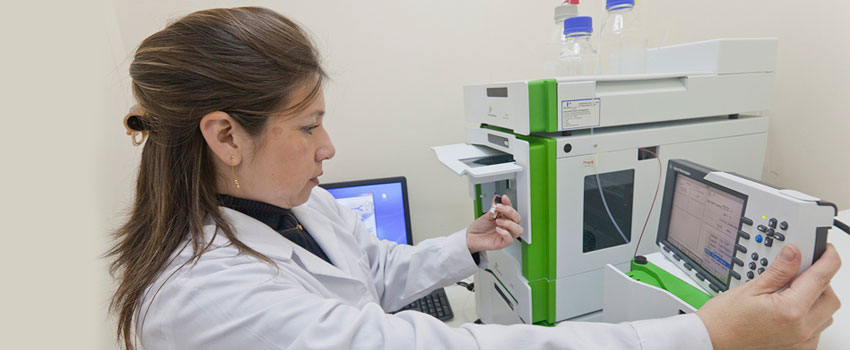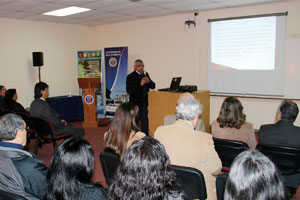- News
Regional food industry benefits from the provision of modern quality control laboratory services

The University of La Serena and the Coquimbo Region have a specialized laboratory that responds to the requirements of analysis, technical assistance, development and innovation in the field of food.
A food analysis and quality control laboratory, implemented with cutting-edge equipment and technology, and professionals trained in the management of analytical techniques, are some of the main results of the project executed by the University of La Serena, through its Department of Food Engineering, focused on offering an innovative service in food analysis in the Coquimbo Region.
The development of this initiative -financed with resources from the Innovation Fund for Competitiveness (FIC-R 2012) of the Regional Government of Coquimbo and the institution itself- has allowed the connection with companies, producers, control organizations and productive associations and that they significantly reduce their technological gap and have technical and human support today to give value to their work.
“We have a very well implemented laboratory for the north of Chile, with trained human resources to be able to respond to the demand of the sector (…). We were able to respond to the analytical requirements of the region, to producers, businessmen and entrepreneurs from the three valleys, Elqui, Limarí and Choapa, and significantly increased the offer of analysis, which allowed us to serve over seventy applicants monthly for eighteen months," he explained. the director of the ULS School of Food Engineering, eng. Francisco Yagnam, coordinator of the project and who is part of the team of academics in charge of the initiative along with Katia Rodríguez (responsible), Elena Lara and María Elsa Uribe, and professionals assigned as technical analysts.
In this regard, the Rector(s) of the University of La Serena, Dr. Jorge Catalán, stated that the project has made it possible to strengthen business innovation, developing trained human capital and optimizing laboratory equipment infrastructure for the benefit of the regional production sector. , also pointing out that the work carried out by the team of academics and researchers from the Department of Food Engineering, "is a clear example of the contribution of the only state university in the Coquimbo Region to regional productive development."
 Another of the results obtained, highlighted by Yagnam, is the provision of services to other regions of the country. “About 40% of the samples that arrived were from applicants from Santiago, which has meant that the work of the laboratory has transcended beyond the region,” said the academic, who added that it is expected to certify and accredit the laboratory to national and international level.
Another of the results obtained, highlighted by Yagnam, is the provision of services to other regions of the country. “About 40% of the samples that arrived were from applicants from Santiago, which has meant that the work of the laboratory has transcended beyond the region,” said the academic, who added that it is expected to certify and accredit the laboratory to national and international level.
Added to these achievements are the laboratory's links with the National Institute of Standardization (INN) and the Chilean Agency for Food Safety (ACHIPIA), which is considered to exist by the Trade and Production Sub-Commission of the Integration Committee of the Agua Negra Tunnel, and that the Northern Agricultural Society incorporated it as support for its development and innovation strategy for its associates. It has also been recognized by the regional ministerial secretariats of Health, Economy and Tourism, and by public and private organizations, municipalities, agricultural companies, food industries and other institutions.
The closing ceremony of the FIC-R project “Modernization of the Analysis Laboratory equipment and technical assistance for the development and innovation of the food industry in the Coquimbo Region”, was held at the ULS premises and was attended by the vice-rector for Economic and Administrative Affairs, Dr. Marcela Aguirre, the director of Research. Dr. Eduardo Notte, the deans of the faculties of Engineering and Sciences, Drs. Alberto Cortés and Gustavo Labbé, directors and academics of the institution, representatives of the Innovation Fund for Competitiveness and various public and private organizations, municipalities and companies, among other guests.
